About the Department
Neurosciences at Manipal saw its origin in 1968 as a combined Neurology and neurosurgery service centre under Prof. Devadiga who single handedly laid the foundation for what was later to become one of the leading neurosurgical centres in South India. Prof. Devadiga holds the credit for having successfully clipped a cerebral aneurysm in this part of the country as early as 1972. After the exit of Prof. Devadiga in early 1977, Dr. Subramanian took over the baton as head of the department. He was an immaculate surgeon and is credited with performing the first transphenoidal pituitary surgery in the country. In June 1979, Dr. Raja joined the department and later went on head the department for nearly thirty years. The present reputation of the department is a direct reflection of his singular and devoted contribution. Prof Arjun Shetty became the head of the department in 2011 and maintained the pace of steady growth in the department. In 2014, Prof. Girish Menon took over the leadership of the department with a keen intent to modernize the department with stress on academics and research.
The department kept pace with technology and has always maintained high standards. The X-ray unit with Image Intensifier was available in 1970. EEG in 1971, ultra Sound in 1972, bipolar coagulator in 1972, Leksell’s Stereotactic Apparatus in 1973, Picker Colour Magna Scanner in 1975 and Serial Casette Changer in 1976. Along with the operating microscope, the installation of a new CT scanner within the hospital premises in 1986, remarkably transformed the outcome of neurosurgical procedures. Today the department performs over 1000 neurosurgical procedure every year which includes all varieties of complex neurosurgical procedures. The Dhanwanthri block as the department of neurosciences is now called was inaugurated in 1992. What started as a 6 bedded Cubicle in a part of a general surgery ward, has blossomed in to a separate ward with a bed strength of around 70 inclusive of intensive care beds. Currently the block has nearly 100 beds, including twenty intensive care unit beds.
The department is equipped with modern technology and equipment starting from the operating microscope, image guidance system (Neuro-navigation), stereotactic biopsy and radiosurgery which are mandatorily necessary to provide state of the art care at par with the best neurosurgical centres anywhere in the world.
The department has always been in leading in the areas of research and academic activities. These include research on haemorrhagic stroke, head injury, pituitary tumours, intracranial aneurysms, glioma and spinal disorders. Department regularly conducts national and international CME's and workshops for the benefits of students and young neurosurgeons.
Faculty in the department are qualified doctorates graduated from eminent neurosurgical institutes of India. Each faculty has further diversified in an area that interests them and this has enabled the varying research profile of the department. Over the years it has found a prominent place in the strengthening of the health system, policies and programs in India.
Adjunct Faculty
· Prof. Paritosh Pandey
Senior Consultant Neurosurgeon
Manipal Hospitals, Bangalore
· Prof. Parameswaran Sanathana Bhattathiri, MBBS, M. Ch (Neurosurgery, SCTIMST), FRCS (Surg. Neuro) Eng
Consultant Neurosurgeon and Lead Clinician (Head of Department)
Institute of Neurological Sciences
Queen Elizabeth University Hospital, Glasgow, U.K.
· Prof. Anantha Babu
Staff Specialist, Department of Neurosurgery
PA Hospital, Woolloongabba, QLD 4102
Supervisor of Surgical Training (Neurosurgery), PA Hospital, Woolloongabba, QLD 4102
Member of NSA Research Committee, Neurosurgical Society of Australasia
Member of Academy of Surgical Educators, The Royal Australasian College of Surgeons
Alumni
PhD Awarded/Ongoing
Amreen Mahmood, 2020 |
Measurement of adherence to home-based exercises among community-dwelling stroke survivors in India Manipal Academy of Higher Education |
DAC member |
Ongoing |
||
Divya B, 2021 |
Exploring Application of radiomics in brain tumour assessment |
Co guide |
Shrishma Rao,2021 |
Development of an intelligent framework for automated brain tumour classification and diagnosis |
Co Guide |
Wasim Ahmed |
Development and validation of a syntactic assessment and treatment protocol for post stroke agrammatism in Kannada |
DAC |
Vidya V |
“Design and development of an automated system for the assessment of traumatic brain injury |
DAC |
Venkata Suryakumar |
Interpreting the biological role of eIF4EBP2 against a null background of eIF4EBP1 and eIF4EBP3 to identify its activators and repressors as potential therapeutic targets in Astrocytoma. |
Co Guide |
Apoorva MS |
Strategies to enhance activity levels for motor recovery in early phase of stroke |
DAC members |
https://manipal.edu/mu/academics/phd.html
Services Offered
The department is primarily involved in the treatment of neurosurgical patients suffering from neurological disorders including traumatic brain injuries, intracranial vascular abnormalities, epilepsy, tumors, spine problems, skull base anomalies etc. The operating rooms are well equipped with most modern gadgets including navigation systems, surgical microscopes, drills, image intensifier, intraoperative ultrasound, intraoperative neuro-monitoring and CUSA. The department has two elective operating rooms and one emergency operating room which are sufficiently equipped to conduct all types of complex surgeries. We provide trauma services round the clock.
Clinical services provided by the department are described in brief as below.
Traumatic brain injury management: Trauma services are provided round the clock. Patients suffering from head injuries are stabilized initially in the casualty within an hour of reaching the hospital. All types of head injuries including scalp injuries, fractures of skull, CSF rhinorrhea, brain contusion, intracranial hematomas and managed by the dedicated trauma team. Dedicated ICU and ward is available to manage all types of head injuries.
Vascular abnormalities: All types of vascular abnormalities including aneurysms, AVMs, Moya Moya diseases, dural AV fistulas are managed effectively. Special cares are given to these patients during perioperative period by the dedicated team.
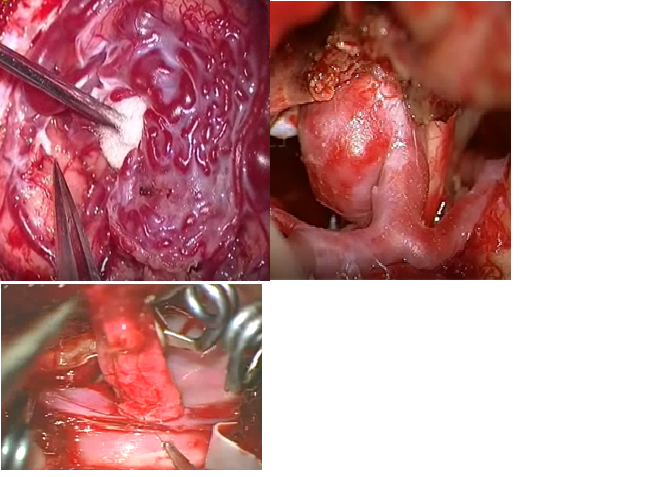
Spinal Surgery
All types of complex spinal surgeries with or without instrumentation including complex cranio-vertebral junction anomalies, traumatic vertebral body fractures, spinal canal stenosis are performed routinely in the department. Navigation guided instrumentation and minimally invasive spinal surgeries are being performed as per the indications.
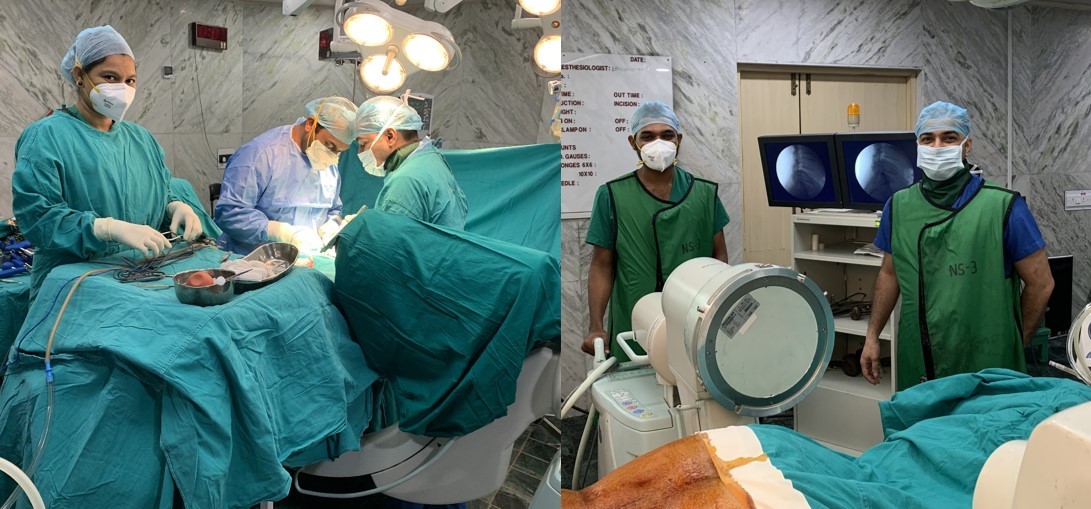
Endoscopic Surgeries:
Endoscopic surgeries are routinely performed in the department. Intracranial tumors like nonfunctioning pituitary macroadenomas, functioning pituitary microadenomas, anterior skull base tumors, third ventricular tumours and hydrocephalus are effectively dealt with the endoscope.
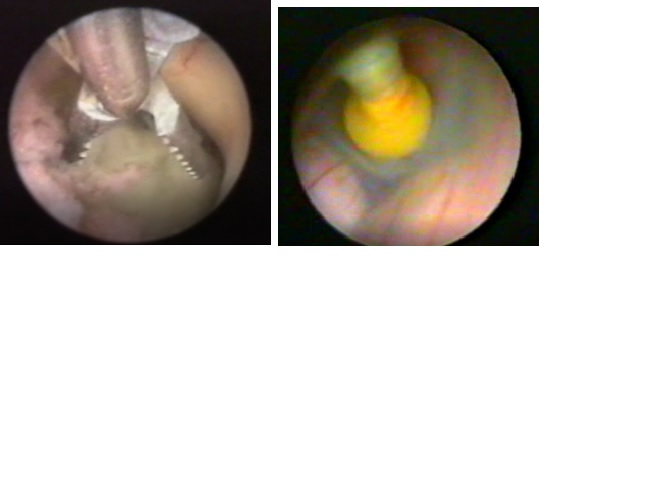
Skull base Surgery:
Skull base masses are requiring complex neurosurgical techniques, neuronavigation and intraoperative monitoring. The department is well equipped to deal any types of skull bases lesions.
Peripheral nerve surgeries:
Department also manages the traumatic brachial plexus injuries and tumors involving the peripheral nerves.
Neurooncology:
The department handles all types of benign and malignant tuomors of brain and spinal cord. Surgeries of these tumors are done with the help of operating microscopes, neuromonitoring, intraoperative USG and neuronavigations. Tumors of the eloquent areas of brain are done by awake craniotomies. Intraoperative frozen section biopsy is also available to the department.
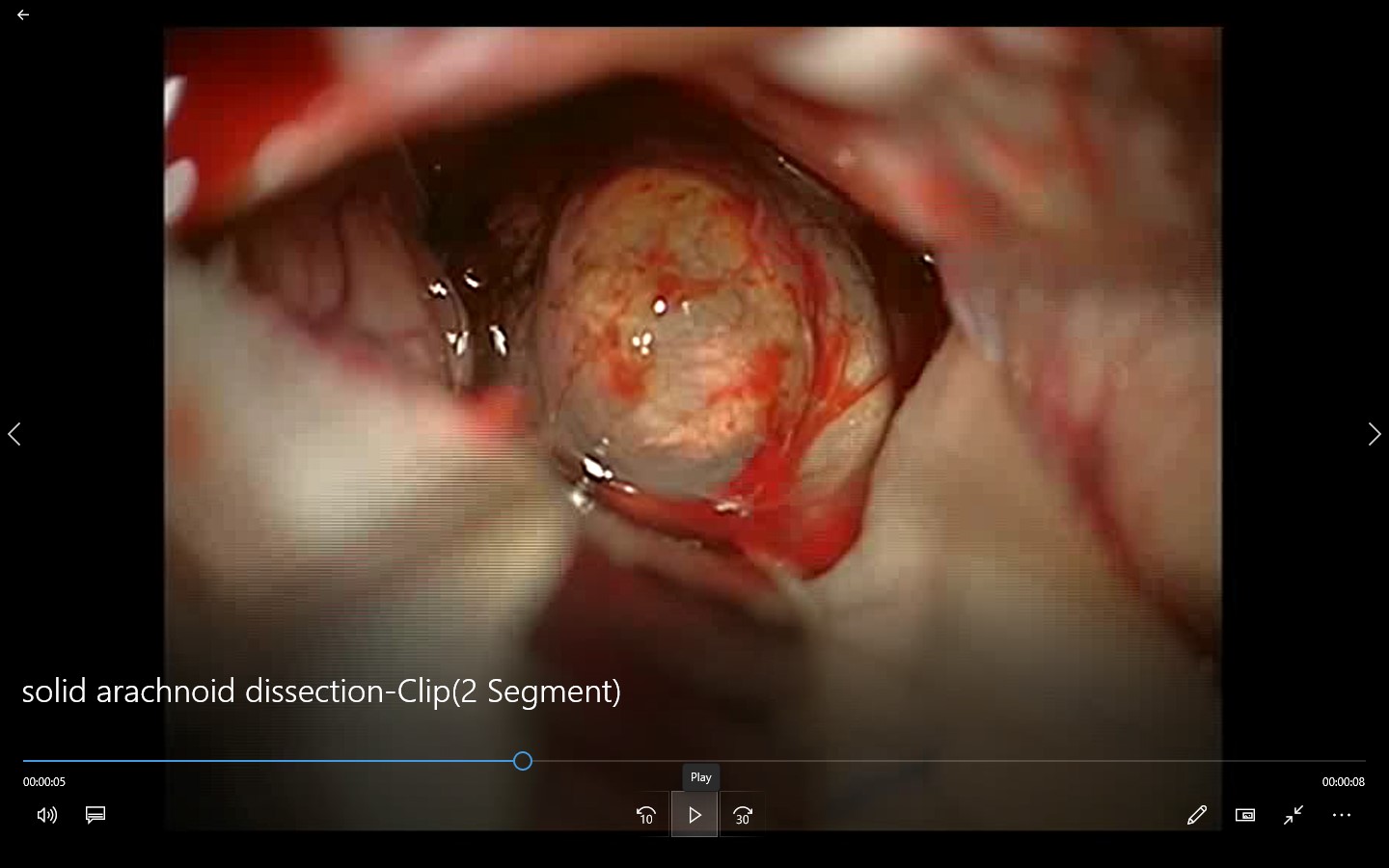
Epilepsy Surgery
Department performs various types of surgical procedures for epilepsy patient. Drug refractory epilepsy cases are evaluated and selected for the surgeries with the help of neurology department. All types of lobectomies and dissection procedures and hemispheorotomies are performed here.
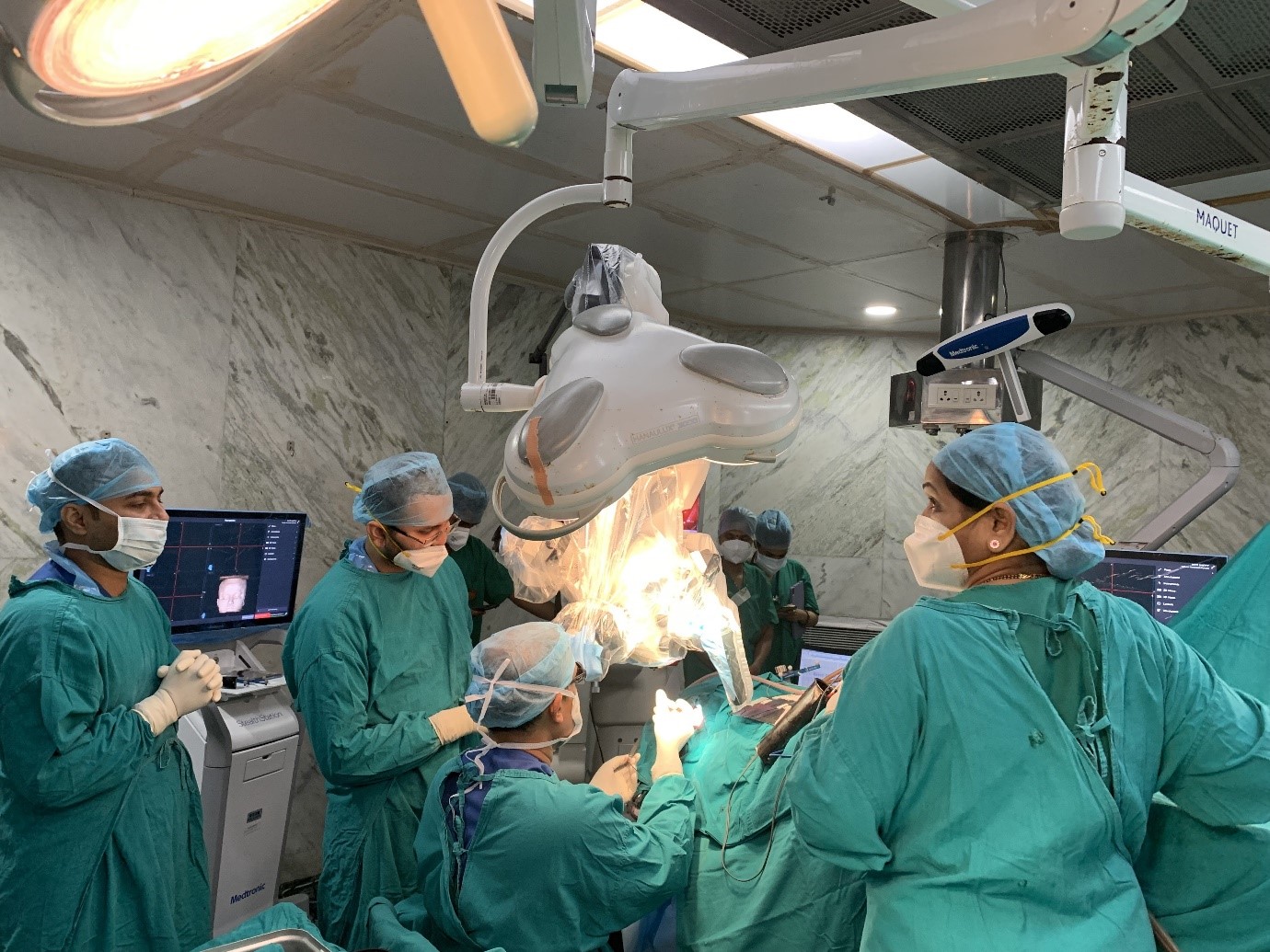
Research
Ongoing research
Virtual reality based 3 D planning for neurosurgery |
Dept. of IT and BT, Govt. of Karnataka |
Ongoing |
2019 |
35 L |
Manipal Institute of Technology (MIT) |
Exploring Application of radiomics in brain tumour assessment |
SPARC |
Ongoing |
2019 |
5 L |
NIT Surathkal |
Exploring the Functional Connectivity of Epileptogenic Networks using Electrical Source Imaging |
Intramural |
|
2020 |
|
Manipal Institute of Technology (MIT) |
3D reconstruction of a brain tumor for the progressive assessment of residual / recurrent tumor for Neurosurgical treatment planning |
Intramural funding |
|
2021 |
|
Manipal Institute of Technology (MIT) |
Application of Machine Learning methods to predict mortality and morbidity in Spontaneous Intracerebral Hemorrhage. |
|
Pending |
2021 |
|
Michael E. DeBakey VA Medical Center Stroke Program ,and Analytical Software and Engineering Research Laboratory, Department of Neurology (P.M., N.S., T.A.K.), Baylor College of Medicine, Houston, Texas |
Publications
1. Prasad GL, Menon GR. Intraoperative Temporal Horn Ventriculostomy for Brain Relaxation During Aneurysm Surgeries in Pterional Approaches. World Neurosurg. 2021 Jan;145: e127-e130. doi: 10.1016/j.wneu.2020.09.144. Epub 2020 Oct 1. PMID: 33010506.
2. Menon G, Johnson SE, Hegde A, Rathod S, Nayak R, Nair R. Neutrophil to lymphocyte ratio - A novel prognostic marker following spontaneous intracerebral haemorrhage. Clin Neurol Neurosurg. 2021 Jan;200 106339. doi: 10.1016/j.clineuro.2020.106339. PMID: 33183885
3. Hegde A, Menon G , Kumar V , Lakshmi Prasad G,. Kongwad LI ,Nair R, Nayak R. Clinical Profile and Predictors of Outcome in Spontaneous Intracerebral Hemorrhage from a Tertiary Care Centre in South India .Stroke Research and treatment Volume 2020 |Article ID 2192709 | https://doi.org/10.1155/2020/2192709
4. Hegde A, Lakshmiprasad G, Menon G Decompressive Craniectomy in spontaneous intracerebral haemorrhage – A comparison to standard craniotomy with propensity matched analysis. World Neurosurgery https://doi.org/10.1016/j.wneu.2020.09.016
5. Kumar V, Nair R, Kongwad LK, Menon GR Thoracic Myelopathy secondary to ossified ligamentum flavum and dural ossification – a series of 19 cases and review of literature. Interdisciplinary neurosurgery 2019; 15: 78-85
https://eprints.manipal.edu/view/subjects/NEUS.html
Achievements
The staff and faculty of the department of neurosurgery continuously engage in academic and skill enhancing activities which include organizing workshops, conferences, micro neurosurgery skills lab activities
I. Cadaver dissection courses and workshops organized by the department
A. World federation of Neurosurgical Societies (WFNS) Neurosurgical Anatomy Committee- Hands-on cadaveric course on Intrinsic anatomy of the brain, White matter tract dissection & Skull base approaches 30th – 31st January 2019
B. Microvascular Anastomosis workshop 1st Feb 2019
C. “A Hands on Cadaveric Brain Cutting Workshop – Epilepsy surgery” Dr. George Vilanilam, SCTIMST and Dr. Biji Bahuleyan 26th May 2018
D. Workshop on Intraoperative Monitoring and Navigation Systems 23.06.2018
E. Spine workshop & Live operative minimally invasive spine surgery demonstration course: 17.03.2018 and 18.03.2018 Prof. Nupur Prusthi, NIMHANS, Bangalore and Dr. Ajith Kumar, Trivandrum
F. Neurosonology workshop on 25/2//2017
G. Cadaver dissection workshop by Prof. Sanjay Behari – Professor Neurosurgery, Sanjay Gandhi Institute Lucknow on 25th March 2017
H. Hands on Workshop on Spinal Fixation” was organized by our department on 11.07.2015 By Prof. Ravi Mohan Rao, SCTIMST and Prof. Arjun Shetty
I. A Cadaveric Hands – on Workshop on brachial plexus surgery was conducted on the 14th November 2015 and the course coordinator was Dr. Sumit Sinha, AIIMS, New Delhi
II. Conferences and scientific meetings organized
A. Stroke CME Dr. T MA Pai Hall, 2nd Floor 24.06.2018
B. CME on Movement Disorder Mangalore 24.03.2018
C. Clinical and Nursing Update 2017 on 12.08.2017
D. A Neurosurgery update was organized on “Craniosynostosis” – on 18.04.2015
E. A one day CME program was conducted on neurotrauma – TRAUMACON MANIPAL’15 at Dr. TMA Pai Hall, on the15thNovember2015
F. Karavalli Chapter of NSI Fortune Valley 18th Sept 2018
G. “Brain Tumour Update 2016” was organized by the Department of Neurosurgery, Kasturba Medical College, Manipal on 27th August 2016
Gallery
Faculty
Contact Us
Google map : https://goo.gl/maps/wqkc7Xve6VVsWxNz7
Email : neurosurgery.kmc@manipal.edu
Phone number : 0820-2923093
